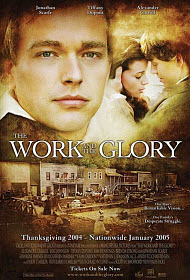The Work and the Glory
 for some mild thematic elements and violence.
for some mild thematic elements and violence.
Reviewed by: Bob Betts
CONTRIBUTOR
| Moral Rating: |
Better than Average
but not recommended due to misleading content of a serious nature
|
| Moviemaking Quality: |
|
| Primary Audience: | Adults |
| Genre: | Romance Drama |
| Length: | 1 hr. 58 min. |
| Year of Release: | 2004 |
| USA Release: |
November 24, 2004 (limited—Utah) January 21, 2005 (wide) October 16, 2006 (re-release) |



With so many cults and denominations, how can I decide which are true and which are false? Answer
What are the differences between Mormonism and Christianity? Answer
Mormonism: A Survey and Biblical Critique
Is there any archaeological evidence for the claims made in The Book of Mormon regarding Jesus’ visit to the Americas? Answer
Should a Christian pray about whether to believe the Book of Mormon? Answer
Is marriage eternal? What about the Mormon claim that LDS temple marriage is forever, not “till death do us part”? Answer
What is a cult? Answer
| Featuring |
|---|
| Sam Hennings (Benjamin Steed), Brenda Strong (Mary Ann Steed), Eric Johnson (Joshua Steed), Alexander Carroll (Nathan Steed), See all » |
| Director |
|
Russell Holt |
| Producer |
| Manchester Pictures, Vineyard Productions, Jeff T. Miller, Larry H. Miller, Scott H. Swofford |
| Distributor |
| Excel Entertainment |
“One Man… A Remarkable Vision; One Family… A Desperate Struggle”
This is an independent, LDS-themed (Church of Latter-Day Saints / Mormon) movie released in theaters.
From the first volume of the book series entitled “The Work and the Glory,” Mormon author Gerald N. Lund’s romance novel comes to the big screen, adapted by director Russel Holt. Most of the story centers around the daily life of the fictitious Steed family and their occasional, but life-changing, interaction with the Mormon prophet, Joseph Smith, between 1826 and shortly after the publication of the Book of Mormon and the formation of the Mormon church in 1830.
In 1826, the Steed family moves from Vermont to Palmyra, N.Y. to start a new farm. Upon the recommendation of a neighbor, Martin Harris, one of the “Three Witnesses” to Joseph Smith’s gold Book of Mormon plates, Benjamin Steed hires Joseph Smith and his brother Hyrum to help Benjamin and his two adult sons, Joshua and Nathan, clear trees and plant crops before it’s too late in the planting season.
The romance part of the movie comes into play with the two Steed brothers being equally smitten with Lydia, the General Store owner’s daughter. Numerous passionate kisses, first between Lydia and Joshua, then with the younger Nathan, along with a fist fight and the threat of a gunfight between the brothers over Lydia, gives the movie a PG rating. One additional fight takes place between Joseph Smith and the greedy Joshua Steed and one of Joshua’s bad-guy buddies, Will Murdock, who are both attempting to wrestle the sack of gold plates away from Joseph.
Three groups of people are portrayed in this film: Joshua Steed and the Murdocks, who scheme to get their hands on Joseph’s gold treasure; the townsfolk, Benjamin Steed and Lydia’s parents, portrayed as intolerant, hypocritical, mean-spirited Christians, who mercilessly ridicule Joseph Smith and his family; Joseph and his family, Martin Harris, Nathan Steed and his mother, Mary Ann, along with his younger siblings, portrayed as spiritual, down-to-earth, reasonable, peaceable, kind, loving, understanding, confident and undaunted, though sometimes sad and defensive victims of the persecution from the other two groups.
After hearing and eventually believing Joseph’s stories of a visitation from God and Jesus Christ, visitations from an angel and buried gold plates, Nathan Steed befriends Joseph and Emma Smith and winds up defending them before the townsfolk, who are all angrily abuzz about Joseph’s incredible tales.
At one point in their conversation with Nathan, Joseph and Hyrum smile and make light of the townsfolk for calling Joseph’s claims “evil and devil-work” and for calling Joseph “a fraud” and “the devil’s own servant.” In this scene, Joseph and Hyrum portray the townsfolk as over reactive and irrational, while Joseph and Hyrum act like ordinary, sincere, good-natured, levelheaded, young gentlemen.
Separating fact from fiction will be impossible for most viewers, Mormon or not, unfamiliar with Joseph Smith’s real history. Yes, Joseph Smith did claim to be visited by God and Christ with whom he conversed, and later by an angel who showed him the location of the gold plates from which he was to publish the Book of Mormon. Yes, he did start a church. And, yes, it is likely that a number of people, especially Christians, were vocal skeptics and critics of Joseph and his incredible claims.
Mormon history portrays Joseph Smith as having attained little formal education and as being a rather illiterate farm boy. And, therefore, Mormons conclude that he was incapable of producing The Book of Mormon without the inspiration of God. It was a miracle. The Martin Harris character in the movie makes a point of so informing one inquisitor. Yet, throughout the film, Joseph always speaks eloquently, using perfect grammar. This is also strange since the original Book of Mormon has undergone thousands of grammatical and spelling changes in succeeding editions. Most people, myself included, believe Joseph Smith was the actual author of The Book of Mormon instead of it being from ancient manuscripts, as he claimed.
One fact deliberately omitted from the film, occurred in the scene in which Joseph is recounting his story to Nathan, about asking God and Christ which sect (church or denomination) he should join, which is also recounted in the Mormon scripture, Pearl of Great Price. Joseph said, “I was answered that I must join none of them.” In the movie, Joseph stops there. However, in the Pearl of Great Price, Joseph said God also told him “they (the sects) are all wrong.that all their creeds were an abomination in his sight; that those professors (ministers) were all corrupt.” You can see why this offensive bit of information would be withheld from non-Mormon viewers.
In the same scene, Joseph’s brother Hyrum sees the troubled look on Nathan’s face after hearing Joseph’s stories. Hyrum kindly smiles and in a soft voice, gives Nathan some anti-biblical advice, “Trust your heart, Nathan.” (Read Jeremiah 17:9 and Proverbs 28:26)
Another fact omitted is Joseph Smith’s 1826 trial and conviction for being a “glass looker” (telling where hidden treasures can be found in the earth through the medium of a see-through stone, called a “seer” or “peep” stone). In fact, it is documented that in the 1820s Joseph Smith and his family used divining rods and seer stones as part of the folk magic of treasure hunting. Joseph and his family also believed in and used ritual magic, astrology, talismans and magic parchments. I’m certain this information was withheld because Mormon leadership consider it to be “not faith promoting.”
As I viewed “The Work and the Glory” on it’s opening night in Chandler, Arizona, in a less than half-filled theater of mostly Mormons, it deeply saddened me to think that so many, Mormons and non-Mormons alike, will be fooled by this story that withholds so many historical facts about Mormonism’s beginnings, as well as the truth about Joseph Smith and his family.
The movie, itself, is well directed. The cinematography is well done. The scenery is beautiful and appears accurate historically. The quality of acting is at or above what you might expect from a major motion-picture version of a romance novel. It would be a good family film, if it were not for its misleading content and vital historic omissions. I cannot recommend this film because it depicts an extremely sanitized version of the character of Joseph Smith, subtly portrayed as being sanctified by God, along with the Book of Mormon, excitedly and adoringly portrayed as inspired scriptures brought forth by God in these latter days. (See relevant issues list for further information. Also visit Concerned Christians for additional information on Mormonism.)
Violence: Minor / Profanity: None / Sex/Nudity: None
See list of Relevant Issues—questions-and-answers.


Excellent!/5
Moral rating: Excellent! / Moviemaking quality: 5
Good/4½
Good/4½
My Ratings: Excellent!/4½